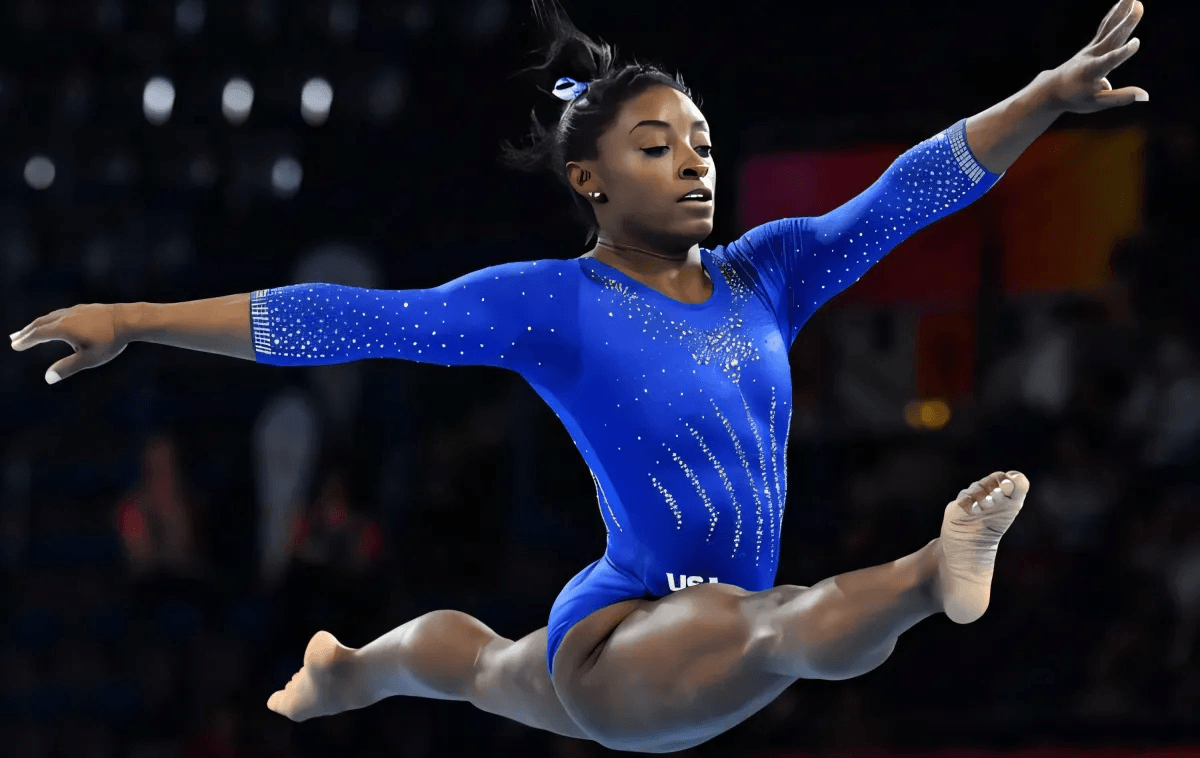The Mental Health Struggles That Athletes Face

As family and friends gather around the television to watch the 2020 Olympics in Tokyo, excited and ready to see Team USA crush it, we should remember the athletes getting ready for the biggest performance of their professional careers. They too are excited but also under immense pressure to succeed and bring home the gold. And if they are like athletes Simone Biles or Naomi Osaka, the pressure is even bigger because of their high-profile status.
The topic of mental health has been on everyone’s mind after seeing gymnast Simone Biles withdraw from the team final and individual-all around competitions just a few days ago. The reason for the withdrawal was not physical but dealt with her mental well-being. In her own words, Biles is quoted as saying that her, “mind and body are simply not in sync.”
It begs the question, why don’t we give more attention to the mental health issues that plague athletes before, during, and after the Olympics? We unfairly put pressure on these athletes to do their very best to the point we forget their human beings putting their bodies through rigorous hours of training. It’s a discussion that must be had as too many Olympians and non-Olympian’s struggle with depression.
Let's be honest, you're probably like me and don't pay attention to 90% of the sports featured in the Olympics. It's only when this event comes along every four years, we decide to cheer and scream for Team USA. Once the Olympics are over, we go back to our everyday lives, forgetting the people who trained their bodies to deliver their best performance for this one glorious moment.
Imagine how these performers feel when they go back home, worn out and ready to finally rest their bodies but they can't because they've got post-depression blues. In comparison, think of it as your four-year journey in college. You've spent 4-6 years studying various subjects all to graduate with a degree in a specific field, and once you've achieved that degree, you're left with the "what nows"? You're left to wonder, who am I now that I've graduated?
Professional athletes face that identity crisis all the time, especially after a monumental event such as the Olympics. And when they cry out for help, they're looked upon as weak because they're supposed to be strong and not need to ask for help. And that mentality needs to change.
Why are mental health issues that countless athletes struggle with glossed over so easily? And why are they expected to keep it to themselves and "get over it?" It isn't fair to these athletes to treat them like machines that never break down.
They are still humans at the end of the day who need to take time for themselves and get the help needed to get back into a positive mental state. Looking at how Simone Biles has gotten worldwide support about her decision to withdraw from because of her mental health is very telling to me. It shows that many athletes also feel the same way and unfortunately despite asking for help, don't receive it.
We've seen it with Olympians such as Jeret "Speedy" Peterson and Steven Holcomb, famous athletes who suffered from depression and tragically took their own lives. Something needs to be done to make sure athletes have the resources to get help, and most importantly, be allowed to take mental health breaks as needed.
The idea for this article initially stemmed from watching this documentary on HBO called The Weight of Gold. Weight of Gold focused on exploring the mental health challenges that Olympians face. Because of COVID-19, the postponement of the Olympics games in Tokyo forced athletes to evaluate the question of "What now?" After training for over four years, they were faced with the difficult decision on whether to continue to train or take a step back and see where that leads them.
Those who continued to train were faced with the various lockdowns across the United States and had to use whatever tools were available to train for their respective sports. The pandemic further heightened the mental struggles of said athletes without a major competition to focus on and made them start to question who they were as individuals outside the sport. One of the athletes featured in the film was decorated Olympian Michael Phelps.
I still remember being in awe of Phelps watching him in the last two Olympics constantly smash records and wowing the world with his talent. Sometimes it seems impossible to imagine the feats he could accomplish in the water!
He too struggled with distinguishing Michael Phelps the Olympic swimmer from Michael Phelps the non-swimmer. After decades with one continuous identity, I can't imagine how that must've been for him, struggling to find yourself after accomplishing so much.
We must remember that athletes are human beings first before they are sportsmen and sportswomen. So as you're watching the last few weeks of Olympics games and observing these incredible athletes put on great performance after performance, remember that it doesn't matter about the medal count. It doesn't matter if they don't receive a medal. And it doesn't matter if they decided to withdraw from the competition for their mental health. They are doing it for their own safety so be respectful of their decisions.
Opinions and Perspectives
This article really drives home why we need to support athletes both on and off the field.
The stigma around mental health in sports seems to be slowly changing, but we still have far to go.
Wonder how many potential champions weve lost because they couldnt access proper mental health support.
Its time we stopped treating athletes like entertainment and started seeing them as human beings.
The part about using whatever tools were available during lockdown really highlights their dedication.
Im glad were finally having these conversations openly instead of sweeping them under the rug.
The pressure from family and coaches must be intense too, not just from the public.
Just imagine training your whole life for one moment, and then struggling with what comes after.
Never considered how the identity crisis could impact athletes transitioning to normal life.
The documentary mention was helpful. Going to watch The Weight of Gold to learn more.
I appreciate how this article emphasizes that medals arent everything. The human cost matters more.
Its shocking how little attention this got before high-profile athletes started speaking up.
The isolation of individual sports must make mental health challenges even harder to deal with.
Maybe we need to redefine what strength means in athletics. Mental health awareness is strength too.
I worry that well lose great athletes who choose to protect their mental health instead of competing.
My coach always said mental toughness was everything, but never taught us how to maintain it healthily.
Makes me wonder about all the athletes who struggled silently before it became more acceptable to discuss mental health.
The parallel between athletic and academic burnout is something I never considered before.
I used to think taking a mental health break was weak, but this article changed my perspective completely.
This article really challenges the no pain, no gain mentality thats so prevalent in sports.
Interesting how we celebrate comeback stories but rarely discuss the mental toll of recovery.
The Olympics should include mental health resources as part of their standard athlete support package.
Anyone else think we should have regular mental health screenings for athletes, just like physical checkups?
Reading this made me realize how little support there is for athletes transitioning out of their sports careers.
The pressure on young athletes particularly concerns me. They're still developing emotionally while dealing with intense stress.
Im curious about how other countries handle athlete mental health. Maybe we could learn from different approaches.
This reminds me of how important it is to have multiple sources of identity and not just one defining characteristic.
The part about COVID forcing athletes to reevaluate really struck me. Must have been incredibly challenging.
We need more articles like this. Mental health in sports has been taboo for too long.
I actually found myself getting emotional reading about the post-Olympic blues. Never considered that before.
Yes! The double standard is real. When men step back its strategic, when women do its seen as weakness.
Anyone else notice how female athletes seem to face even more scrutiny when they speak up about mental health?
Its fascinating how we criticize athletes for prioritizing mental health but praise them for competing through physical injuries.
Reading about their identity struggles makes me realize how much of themselves they sacrifice for their sport.
Sometimes I wonder if the Olympics has become too commercialized. The pressure to perform for sponsors must be intense.
The resources for mental health support in sports seem inadequate. We need better systems in place.
My daughter is a competitive gymnast and this article really makes me think about the pressure we put on young athletes.
I watched The Weight of Gold too. It was eye-opening to see how many athletes struggle with depression after their careers end.
Thank you for mentioning Jeret Peterson and Steven Holcomb. We need to talk about these tragedies to prevent more from happening.
The media coverage is definitely part of the problem, but social media has made it even worse. Athletes cant escape the pressure now.
Does anyone else think the media plays a huge role in this? The constant spotlight and scrutiny must be unbearable.
I found the part about only paying attention every four years particularly convicting. We demand perfection but only care briefly.
The pandemic must have made everything so much harder for these athletes. Training alone, uncertainty about the games, extra year of pressure.
Michael Phelps speaking out about his struggles really opened my eyes to this issue. If someone that successful deals with it, imagine others.
Sorry, but I strongly disagree with that last comment. No one signs up for mental health struggles. These are real human beings, not machines.
While I support mental health awareness, I still think athletes have a responsibility to push through. They knew what they signed up for.
The comparison to graduating college really hit home for me. That identity crisis is so real.
I never thought about the post-Olympics depression until reading this. Makes so much sense given the buildup and then sudden void afterward.
Absolutely agree. The mental toll of training for years and having everything ride on a single moment must be overwhelming.
I really appreciate how this article sheds light on the immense pressure athletes face. What Simone Biles did was incredibly brave.
